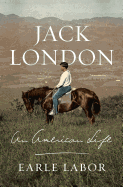
When Earle Labor was a boy, he named his dog Buck, after the protagonist of Jack London's The Call of the Wild. Labor grew up to become the curator of the Jack London Museum in Louisiana and the editor of The Portable Jack London. His affectionate, meticulous and beautifully written Jack London: An American Life--the definitive biography of the iconic "American Kipling"--is based on a half-century of study.
After a hardscrabble youth, London (1876-1916) lived a hobo's life, worked on a schooner, then attended UC Berkeley briefly before heading off to the Klondike Gold Rush. These experiences laid the foundation for his fierce socialist outlook on life. He read voraciously and committed himself to writing 1,000 words a day, six days a week.
He started to get stories published in the Black Cat and Overland, then Harper's and McClure's. The novels followed; with his third, in 1903, he struck paydirt. The Call of the Wild manifested a "special genius," written in what London called "a sheet of flame."
London went on to write other fine novels, including The Sea Wolf, Martin Eden and The Iron Heel, as well as a hobo memoir, The Road, that influenced Hemingway, Steinbeck and Kerouac. He continued to travel and built his own house and boat--though he and his wife barely survived their trip through the South Pacific. A busy life of writing and public speaking took its toll. In 1914, he wrote, "I shall go down into the darkness standing by my opinions, and fighting" for them. London died two years later, a few weeks shy of his 41st birthday. --Tom Lavoie, former publisher

